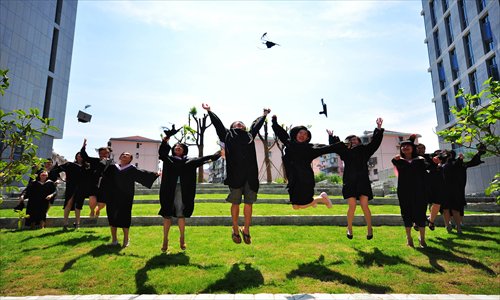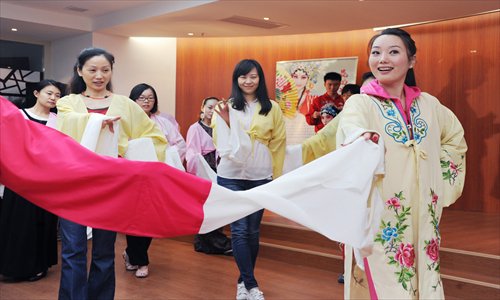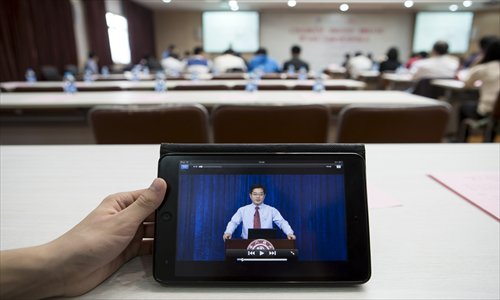Banking on education

A new education platform will make it easier for students in Shanghai to graduate. Photo: IC
There's a new bank in Shanghai but this one doesn't deal in money. Established in 2012 the Shanghai Academic Credit Transfer and Accumulation Bank for Lifelong Education (SHCB) deals in academic qualifications from minor diplomas to major degrees.
It's a way of letting people accumulate qualifications in a range of subjects over the years and be able to access these and have them count towards an advanced degree or another qualification when they need it.
Its ultimate aim is to break the "one examination decides one's life" basis of education in China. Most adult education affiliated colleges in Shanghai have joined the bank.
For Wang Chen, one of the bank's earliest customers, the new system has already proved valuable. Wang is an electrical maintenance engineer with Shanghai Volkswagen. This year he had to enrol for an undergraduate course at the School of Continuing Education with the University of Shanghai For Science and Technology (USST).
With assistance from the bank Wang found his junior college test results would be credited by the university. And because he has a national College English Test-6 Certificate and an advanced diploma for electrical maintenance, he is exempt from having to take four otherwise compulsory courses at the university.
"It's really good for me and saves me a lot of time," Wang said.
Wang is one of the 604 students at the USST who have been allowed to transfer credits and diplomas from outside the university. In the past year 604 students have transferred 3,668 school credits, over 1,124 courses, said Huang Kai, a section head with the School of Continuing Education, USST.

The website of the Shanghai Academic Credit Transfer and Accumulation Bank for Lifelong Education Photo: Yang Hui/GT
An important part
The USST is only one of the institutions now linked to the bank which was sponsored and is managed by the Shanghai Municipal Education Commission. It is considered to be an important part of Shanghai's lifelong education system, offering citizens a platform for the recognition, accumulation and transfer of educational achievements.
At present 53 continuing education schools, colleges or universities, and 15 independent adult colleges and universities have joined the bank in Shanghai. The bank has 21 branches located in 17 districts all over Shanghai and this is the first platform of its kind in China.
Sun Yaoting is the vice director of the bank's administration center and said that up to mid-November, 409,238 people in Shanghai had opened accounts with the SHCB depositing 940,000 test scores from a variety of schools and institutions. More than 100,000 credits have been transferred already and that does not include the fall semester.
USST's Huang told the Global Times that usually universities concentrated on teaching theoretical knowledge and did not offer practical courses or vocational training. But because practical skills and vocational training are essential for some careers, students have to acquire these outside of their universities. The bank offers students a way of combining their course studies more efficiently.
At its orientation week this year, the USST's School of Continuing Education told students wanting to open accounts with the bank and have credits or diplomas from other institutions approved, to submit applications signed by their course lecturers and copies of the credits or diplomas. The list of the students who had credits approved was later pinned on the school's noticeboards.
Zhang Cailong is the vice president of the School of Continuing Education, Shanghai Donghai Vocational and Technical College. He said Donghai joined the bank this year and all of the 400-plus students of the school had opened accounts. The school is now reviewing the various credits that will be accepted and credit transfers will begin next semester.

Residents enjoy a Kunqu Opera class at a Gubei community center. Photo: CFP
Personal links
It is not just a matter of accepting pieces of paper either. The bank provides personal links between universities and colleges to improve the ways educational credits are assessed.
Liu Luxi, the deputy dean of the School of Continuing Education, at the Shanghai Jiao Tong University, is a member of the Shanghai Adult Education Association's special committee to oversee transfer standards. She said the association has published a guide for colleges on how to accept different kinds of certificates and qualifications.
The first batch of courses promoted in the guide includes business management, administration management, logistics management, English, accounting and computer science - now 469 certificates and diplomas in these courses can be credited to 16 different major degrees.
An English professor herself Liu explained to the Global Times that students who have suitable scores in tests like TOEFL, IELTS, the Business English Certificate, the National College English Test, the Public English Test or the Shanghai Interpretation Accreditation, now no longer have to attend some university English courses. Liu said this was good for students because it stopped them having to study things that they had already learned and gave them more time.
But the bank is only a platform and it is entirely up to universities whether they will recognize another institution's credits or not. USST's Huang said that as well as following the education association guide, the university had set up a panel of experts (retired professors) in engineering, economics and management, and the arts to draft its own academic credit guidelines. Some courses and diplomas not listed in the association's guides are now recognized by the university.
Huang said that if these diplomas weren't recognized by any other schools or institutions they would just be objects of beauty and worthless - "It makes no sense."

A student checks out a televised lecture at the Shanghai Jiao Tong University. Photo: CFP
Basic framework
Donghai's Zhang Cailong said this was the first time Shanghai institutions had established criteria to assess nonacademic courses. He said the association's guide only offered a basic framework and needed to be extended. Donghai has now begun to recognize diplomas from the Shanghai Municipal Human Resources and Social Security Bureau and some independent factory qualifications, like the diplomas for machinists and lathe operators. Zhang said these diplomas could be worth gold.
But not everyone is enthusiastic about the bank. Zhao Xiaolong is the vice president of the School of Continuing Education with the Shanghai Aurora Vocational College. He told the Global Times that the school had joined the bank and would help its 100 students open accounts next semester but he said the bank was "almost meaningless" for the school.
"We are a small school and students who enrol at our school usually do not have diplomas that can be transferred for school credits. Graduates from our school may not have qualifications that will be recognized by other institutions." Zhao said the school joined the bank only because it was required to do so by the Shanghai Municipal Education Commission.
The Shanghai Distance Education Group which promotes the bank for the municipal education commission declined an invitation for an interview with the Global Times suggesting it was too early at this stage of the bank's establishment.
The bank does not look at all like a bank - in fact it is more a virtual bank. There is a branch at the Shanghai Open University in Guoshun Road. An official surnamed Huang confirmed that the free service was to date largely employed by students. She said if customers had all of the documents required and the diplomas they could be processed in two weeks. Because joining the bank at present requires a Chinese ID foreigners cannot use the service.
The bank offers an online record of all academic or educational achievements for its customers, whether they are full degrees, diplomas or merely attending courses in neighborhood centers.
The bank's website also welcomes adult leisure and cultural education courses and lists some 3,119 courses like calligraphy and Peking Opera. But not everyone sees the value of the bank. Zhang Jun is a middle-aged housewife studying Traditional Chinese Medicine at the Shanghai Changning Spare-time University. A teacher told her about the bank but she doesn't think she will open an account. "Why? Why should I do this when I know what I have achieved anyway?"
First in the world
Korea was the first country in the world to establish an educational credit bank but its bank has the right to award degrees - if a student has enough credits in a specialist field he or she can be given a degree. Only established universities or colleges can award degrees in China.
Shanghai Jiao Tong University's Liu said that although adult education was intended for people to grow themselves and many enjoyed this, most still took these courses as supplements to potential degrees. If a degree was not possible the courses lose their appeal.
Liu said the bank was in its early days and probably would not be able to extend its services much beyond adult education colleges and trade colleges at present, unlike the US where students can transfer from some community colleges to Ivy League universities and have courses credited.
"The universities here have their complete education system and only students who comply with the university's standards can graduate - it's difficult for a prestigious university to accept external credits."